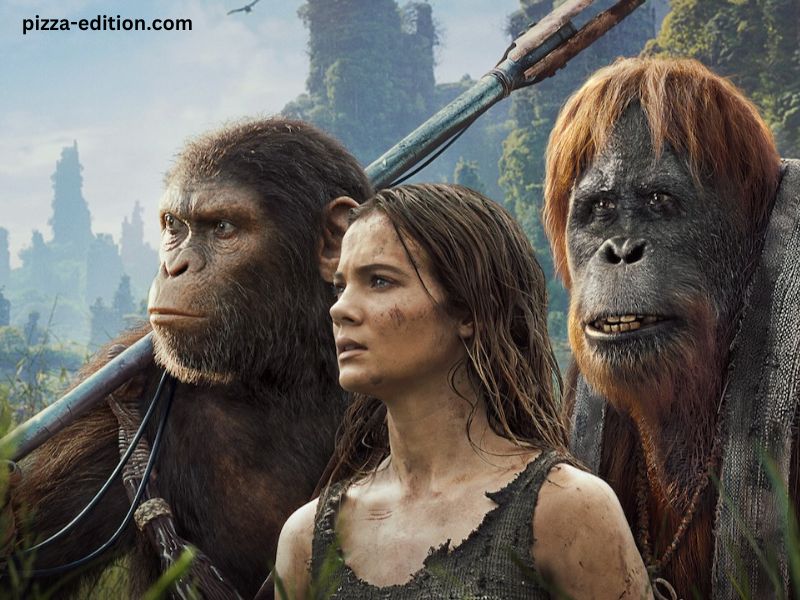The Planet of the Apes franchise is one of the most influential in cinematic history, spanning decades, multiple iterations, and a complex timeline that continues to captivate audiences worldwide. From its origins as a novel by Pierre Boulle to its evolution into a sprawling multimedia franchise, the series has explored themes of race, society, power, and the ethical ramifications of science and technology. In this article, we’ll walk through all the Planet of the Apes films, arranged in chronological order, and explore how each entry contributes to the saga.
1. Planet of the Apes (1968)
Director: Franklin J. Schaffner
Starring: Charlton Heston, Roddy McDowall, Kim Hunter
Release Date: February 8, 1968
The Planet of the Apes saga began with the release of the original film, based on Pierre Boulle’s 1963 novel La Planète des Singes. Directed by Franklin Schaffner and starring Charlton Heston as astronaut George Taylor, the 1968 film introduced the world to a dystopian future where apes have evolved to dominate humanity.
In the film, Taylor’s spacecraft crashes on a distant planet where intelligent apes rule over mute, primitive humans. Taylor becomes a prisoner of the apes, with key characters such as Dr. Zaius (Maurice Evans), an orangutan who is both a religious leader and scientist, and Cornelius (Roddy McDowall), a chimpanzee archaeologist. The film culminates in the famous reveal of the Statue of Liberty buried in the sand, implying that the “planet of the apes” was Earth all along.
The original film’s profound philosophical and sociopolitical commentary on human nature, class systems, and the dangers of nuclear war resonated deeply with audiences, establishing the franchise as an important cultural touchstone.
2. Beneath the Planet of the Apes (1970)
Director: Ted Post
Starring: James Franciscus, Charlton Heston, Roddy McDowall
Release Date: May 1, 1970
The success of the first film quickly led to a sequel, Beneath the Planet of the Apes, which continued the story of Earth’s demise under ape domination. In this installment, astronaut Brent (James Franciscus) is sent to rescue Taylor, only to find that the planet is even more dystopian than he could have imagined.
Brent encounters a human society living underground, worshipping a powerful nuclear bomb, and learns that the apes are unaware of the dangerous nuclear weapons they could unleash. The film ends on a grim note, with the destruction of the planet and the apparent annihilation of both apes and humans.
While the sequel wasn’t as critically acclaimed as the original, it expanded the world of Planet of the Apes and set the stage for the more philosophical and dramatic sequels to come.
3. Escape from the Planet of the Apes (1971)
Director: Don Taylor
Starring: Roddy McDowall, Kim Hunter, Ricardo Montalbán
Release Date: May 21, 1971
Escape from the Planet of the Apes took the series in a bold new direction, shifting away from the Earth-bound conflict between humans and apes. The film begins with the aftermath of the destruction of Earth in the previous movie, as two intelligent apes—Cornelius and Zira (Roddy McDowall and Kim Hunter)—manage to escape the doomed planet in a spacecraft. They arrive on Earth in the year 1973, where they are treated as curiosities and welcomed by scientists.
However, as the apes’ true intelligence becomes apparent, society grows fearful of them. The film explores themes of fear of the “other” and the consequences of technological advancements in a world where humans have lost control. The couple ultimately faces persecution due to the discovery that Zira is pregnant, raising the chilling possibility of an intelligent ape race born in the present day.
This third entry is often praised for its bold narrative choices and social commentary, bringing time travel and a more tragic tone to the franchise.
4. Conquest of the Planet of the Apes (1972)
Director: J. Lee Thompson
Starring: Roddy McDowall, Don Murray, Ricardo Montalbán
Release Date: May 26, 1972
The fourth installment, Conquest of the Planet of the Apes, picks up with Zira and Cornelius’s child, Caesar, now fully grown (played by Roddy McDowall). The film is set in a dystopian future where apes are enslaved by humans, acting as servants and laborers in an oppressive society. The film is a direct continuation of the previous one and marks a major turning point in the franchise, as it shifts focus toward the rise of ape rebellion.
Caesar, who possesses the intelligence of his parents, becomes a symbol of hope and leads an uprising against the human authorities. The film’s powerful message about freedom, equality, and revolution touches on the civil rights movement and social unrest of the 1960s and 1970s, reflecting the tumultuous times in which it was made.
Conquest of the Planet of the Apes is perhaps the darkest film in the original series, showcasing the brutality of both the human oppressors and the violent consequences of the apes’ revolution.
5. Battle for the Planet of the Apes (1973)
Director: J. Lee Thompson
Starring: Roddy McDowall, Claude Akins, Natalie Trundy
Release Date: June 15, 1973
The final film in the original series, Battle for the Planet of the Apes, sees Caesar as the leader of an emerging society where apes and humans are learning to coexist. The film addresses the tension between these two species, as some apes, led by the antagonist Aldo (Claude Akins), want to continue the revolution, while Caesar believes in peaceful coexistence.
Battle for the Planet of the Apes was somewhat of a softer conclusion to the violent uprising of the previous film, with the narrative focusing on building a utopian society rather than further conflict. Despite its attempts at resolution, it struggles to match the power and thematic complexity of its predecessors. Still, the film offers a hopeful, though ambiguous, ending.
The original series concluded with a sense of cyclical history, hinting that the apes’ eventual dominance of Earth was inevitable. Despite the relative lack of fanfare for this last installment, it remains a crucial part of the Planet of the Apes legacy.
6. Planet of the Apes (2001)
Director: Tim Burton
Starring: Mark Wahlberg, Tim Roth, Helena Bonham Carter
Release Date: July 27, 2001
After a long hiatus, the Planet of the Apes franchise was rebooted in 2001 by visionary director Tim Burton. The film, while retaining many of the key elements of the original 1968 movie, presents a new interpretation of the story with a different setting, tone, and visual style. Mark Wahlberg stars as Captain Leo Davidson, who crashes on a strange planet ruled by intelligent apes.
Although Tim Burton’s Planet of the Apes offers stunning visuals and some interesting performances (especially from Tim Roth as the villainous Thade), it was met with mixed reviews. Many fans and critics found the film’s plot to be disjointed and the ending to be overly ambiguous. However, it did offer a new spin on the material, with a unique visual flair, marking a distinct departure from the earlier films.
7. Rise of the Planet of the Apes (2011)
Director: Rupert Wyatt
Starring: James Franco, Andy Serkis, Freida Pinto
Release Date: August 5, 2011
In 2011, the Planet of the Apes franchise was once again rebooted with Rise of the Planet of the Apes, this time telling a more grounded origin story. The film follows Will Rodman (James Franco), a scientist researching a potential cure for Alzheimer’s disease. His experiment leads to the creation of Caesar, an intelligent chimpanzee (played through motion capture by Andy Serkis), who eventually leads a rebellion of apes against humanity.
This reboot was a critical and commercial success, with special praise for Serkis’s performance as Caesar and the film’s exploration of the ethical implications of genetic manipulation. It revitalized the franchise by focusing on the emotional and political dynamics between humans and apes, setting the stage for the more complex sequels.
8. Dawn of the Planet of the Apes (2014)
Director: Matt Reeves
Starring: Andy Serkis, Jason Clarke, Gary Oldman
Release Date: July 11, 2014
The second film in the new series, Dawn of the Planet of the Apes, continues the story of Caesar, now leading a flourishing community of apes in the aftermath of a virus that has wiped out much of the human population. As Caesar tries to maintain peace with the remaining humans, conflict arises as both sides face threats from within and outside their ranks.
The film is a powerful meditation on fear, power, and the fragility of peace. It introduces the character of Koba (Toby Kebbell), an ape who harbors deep resentment toward humans and ultimately leads a violent rebellion. The film’s themes of distrust, survival, and the consequences of war are effectively conveyed, and the visual effects and motion-capture performances are groundbreaking.
Dawn of the Planet of the Apes was lauded for its depth of character, especially in its depiction of Caesar, and for its exploration of societal and ethical dilemmas.
9. War for the Planet of the Apes (2017)
Director: Matt Reeves
Starring: Andy Serkis, Woody Harrelson, Steve Zahn
Release Date: July 14, 2017
The third and final installment of the reboot trilogy, War for the Planet of the Apes, culminates the saga of Caesar’s rise and the apes’ struggle for survival. Set against a backdrop of full-scale war between humans and apes, the film explores themes of vengeance, leadership, and the cost of survival. Caesar is forced to confront his darker instincts as he leads his people in the fight against a brutal human military leader (played by Woody Harrelson).
The film is a fitting and emotional conclusion to the trilogy, with exceptional performances (particularly from Andy Serkis), breathtaking visual effects, and a deep exploration of moral complexity. The ending of War for the Planet of the Apes brings the story full circle, ultimately leading to the inevitable fate of the apes taking over the planet.
Conclusion
The Planet of the Apes series spans a diverse range of genres, themes, and philosophical inquiries, making it one of the most thought-provoking franchises in film history. Whether exploring the ethics of genetic engineering in the modern reboots or grappling with the fall of human civilization in the original films, the franchise continues to resonate with audiences due to its deep social, political, and ethical undertones.
From the original 1968 film to the 2017 reboot trilogy, the series has maintained its relevance, constantly evolving to reflect the changing times. The Planet of the Apes films in order offer a captivating journey into a world where the boundaries between humanity and animality blur, making it a cultural landmark that will continue to inspire thought and conversation for years to come.




